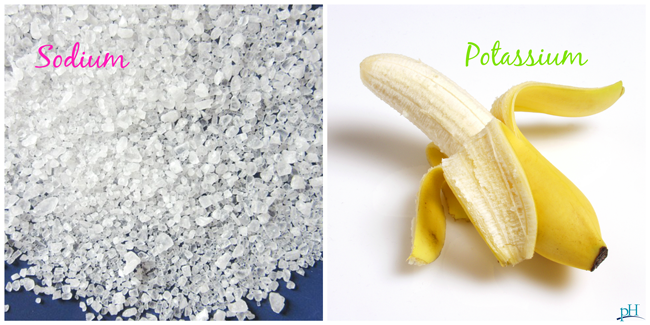Keep your sodium and potassium in check
10 years ago | Nutrition
By pH health care professionals
Sodium and potassium are electrolytes. They drive many of the chemical reactions that occur in the body, causing everything from heartbeats to nerve impulses to digestion of food. And although both sodium and potassium are important, too much of one isn’t a good thing. While the body can usually balance these electrolytes itself, it doesn’t take much to disrupt their balance and cause health problems.
What happens when sodium is out of balance?
Sodium imbalances can cause concerning symptoms like dizziness, confusion, weakness and blood pressure changes.
High sodium levels can be caused by dehydration, medications, or by conditions that interfere with our natural thirst mechanisms, such as dementia. Very high levels can cause brain damage. This condition is rarely seen outside of the hospital.
Low sodium levels can be caused by medications (as well as the illegal drug Ecstasy or MDMA), major diseases, fluid losses in diarrhea or vomiting, or by hydrating too much. It’s rare, but extremely restrictive diets (such as an all-raw food diet with no seasonings) could contribute to low sodium.
However, generally speaking, doctors see more fluctuations in potassium levels than in sodium levels.
What happens when potassium is out of balance?
High potassium levels can cause diarrhea, muscle weakness, irregular heartbeat and/or confusion. Low potassium levels can cause muscle cramps, constipation, fatigue and/or irregular heartbeat.
Illness and tough workouts can deplete potassium. This is why an electrolyte sports drink or banana smoothie can improve cramping later in the day after a workout. Diabetics should also ask their doctors about their potassium levels. Insulin can deplete potassium in the blood. Finally, blood pressure medications (and many other types) can increase or decrease potassium. If you are on prescription medications, ask your doctor if you need a periodic blood draw to check your potassium levels.
Enjoy Your Healthy Life!
The pH professional health care team includes recognized experts from a variety of health care and related disciplines, including physicians, attorneys, nutritionists, nurses and certified fitness instructors. This team also includes the members of the pH Medical Advisory Board, which constantly monitors all pH programs, products and services. To learn more about the pH Medical Advisory Board, click here.



